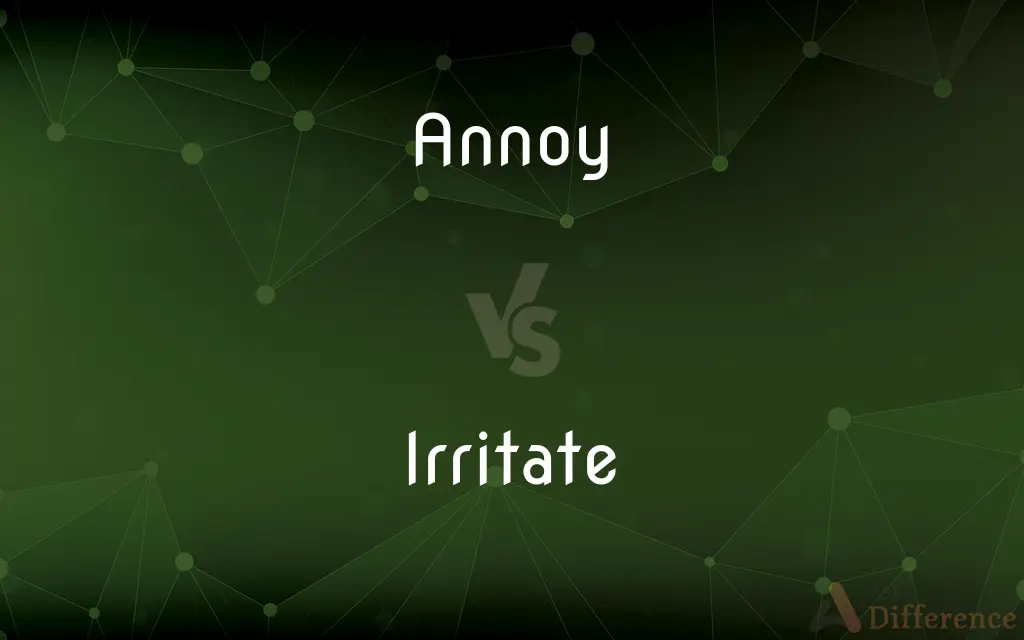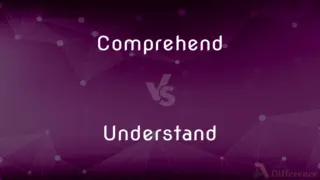Annoy vs. Irritate — What's the Difference?
By Tayyaba Rehman — Updated on October 28, 2023
Annoy refers to causing slight displeasure or discomfort. Irritate implies a stronger or prolonged sense of disturbance, often physical. While both indicate agitation, "irritate" is generally more intense.

Difference Between Annoy and Irritate
Table of Contents
ADVERTISEMENT
Key Differences
The words "annoy" and "irritate" are commonly used interchangeably in everyday language, signifying a sense of displeasure or disturbance. However, there are nuanced differences between the two. Annoy typically alludes to causing a minor inconvenience or slight discomfort to someone.
"Irritate," in contrast, connotes a stronger or more extended sense of disturbance. While it can be used in emotional contexts, it often has physical implications, like a skin rash that irritates or a noise that's irritating to the ears.
In conversations, saying you're "annoyed" usually means something or someone has caused a momentary disruption in your mood. It's a transient feeling that may dissipate quickly once the source is removed.
Labeling something as "irritating" carries a heftier weight. It implies that the disturbance is either more intense or has a more lasting impact. For instance, a person can be annoyed by a fleeting comment but irritated by constant criticism.
To summarize, while both "annoy" and "irritate" relate to feelings of disturbance, the latter typically denotes a stronger or more persistent form of agitation, often with physical implications.
ADVERTISEMENT
Comparison Chart
Intensity
Generally milder
Typically stronger
Common Usage
Emotional discomfort
Both emotional and physical disturbance
Duration
Often transient
Can be prolonged
Examples
Minor inconveniences, short-lived disruptions
Constant disruptions, physical discomfort
Etymology
From Old French "anoier" (to tire, bother)
From Latin "irritare" (to excite, stimulate)
Compare with Definitions
Annoy
To harass or pester.
My little brother annoys me by entering my room without knocking.
Irritate
To cause inflammation or soreness in a part of the body.
The new detergent seemed to irritate my skin.
Annoy
To disturb or bother in a minor way.
Loud phone conversations in the library annoy me.
Irritate
To cause annoyance or discomfort beyond endurance.
The repetitive sound began to irritate her.
Annoy
To be troublesome or vexing.
It would annoy him if he missed his train.
Irritate
To vex or disturb in mind or spirit.
His constant complaining irritates me.
Annoy
To cause slight displeasure.
It annoys me when meetings start late.
Irritate
To provoke impatience or anger.
His arrogance irritates many of his coworkers.
Annoy
To cause irritation to (another); make somewhat angry.
Irritate
To stimulate or excite to an excessive degree.
Bright lights can irritate the eyes.
Annoy
(Archaic) To harass or disturb by repeated attacks.
Irritate
Make (someone) annoyed or a little angry
His tone irritated her
Annoy
(transitive) To disturb or irritate, especially by continued or repeated acts; to bother with unpleasant deeds.
Marc loved his sister, but when she annoyed him he wanted to switch her off.
Irritate
Cause inflammation or other discomfort in (a part of the body)
Sprays and polishes can irritate dry, sensitive skin
Annoy
(intransitive) To do something to upset or anger someone; to be troublesome.
Irritate
To cause (someone) to feel impatient or angry; annoy
A loud, bossy voice that irritates listeners.
Annoy
(transitive) To molest; to harm; to injure.
To annoy an army by impeding its march, or by a cannonade
Irritate
To make sore or inflamed
The smoke irritated my eyes.
Annoy
A feeling of discomfort or vexation caused by what one dislikes.
Irritate
(Physiology) To cause a physiological response to a stimulus in (a cell, body tissue, or organism).
Annoy
That which causes such a feeling.
Irritate
To be a cause of impatience or anger.
Annoy
To disturb or irritate, especially by continued or repeated acts; to tease; to ruffle in mind; to vex; as, I was annoyed by his remarks.
Say, what can more our tortured souls annoyThan to behold, admire, and lose our joy?
Irritate
(transitive) To provoke impatience, anger, or displeasure in.
Annoy
To molest, incommode, or harm; as, to annoy an army by impeding its march, or by a cannonade.
Irritate
(intransitive) To cause or induce displeasure or irritation.
Annoy
A feeling of discomfort or vexation caused by what one dislikes; also, whatever causes such a feeling; as, to work annoy.
Worse than Tantalus' is her annoy.
Irritate
(transitive) To induce pain in (all or part of a body or organism).
Annoy
Cause annoyance in; disturb, especially by minor irritations;
Mosquitoes buzzing in my ear really bothers me
It irritates me that she never closes the door after she leaves
Irritate
To render null and void.
Annoy
To wear out one's patience.
The constant drilling noise began to annoy her.
Irritate
To render null and void.
Irritate
To increase the action or violence of; to heighten excitement in; to intensify; to stimulate.
Cold maketh the spirits vigorous and irritateth them.
Irritate
To excite anger or displeasure in; to provoke; to tease; to exasperate; to annoy; to vex; as, the insolence of a tyrant irritates his subjects.
Dismiss the man, nor irritate the god:Prevent the rage of him who reigns above.
Irritate
To make morbidly excitable, or oversensitive; to fret; as, the skin is irritated by friction; to irritate a wound by a coarse bandage.
Irritate
Excited; heightened.
Irritate
Cause annoyance in; disturb, especially by minor irritations;
Mosquitoes buzzing in my ear really bothers me
It irritates me that she never closes the door after she leaves
Irritate
Excite to an abnormal condition, of chafe or inflame;
Aspirin irritates my stomach
Irritate
Excite to some characteristic action or condition, such as motion, contraction, or nervous impulse, by the application of a stimulus;
Irritate the glands of a leaf
Common Curiosities
Is "annoy" more transient than "irritate"?
Generally, "annoy" suggests a shorter-lived feeling than "irritate."
Which is stronger: being "annoyed" or "irritated"?
Typically, being "irritated" suggests a stronger or more prolonged feeling.
Can "irritate" refer to physical discomfort?
Yes, such as when something irritates the skin.
Does "annoy" imply persistence?
Not necessarily. Annoyances can be fleeting.
Are "annoy" and "irritate" synonyms?
Yes, but they have different intensities and nuances.
Which word might you use for a stronger reaction: "annoy" or "irritate"?
"Irritate" often indicates a stronger reaction.
Can you be "irritated" by a comment?
Yes, especially if the comment causes prolonged discomfort or annoyance.
Can a person be described as "irritating"?
Yes, it means they consistently cause discomfort or annoyance.
Can something be both "annoying" and "irritating"?
Yes, especially if it causes both minor and major disturbances.
Is "irritate" always negative?
While most usages are negative, in some contexts, it can mean to stimulate or excite.
Can an object "annoy"?
Yes, like a squeaky chair might annoy someone.
Is it correct to say "The sun annoys my eyes"?
While grammatically correct, "irritates" might be more appropriate for physical discomfort.
Is "annoyance" the noun form of "annoy"?
Yes, it describes the feeling or the source of the irritation.
Which word has a Latin origin?
"Irritate" originates from Latin, while "annoy" comes from Old French.
Can "annoy" refer to a physical sensation?
Less commonly. It usually describes emotional or mental discomfort.
Share Your Discovery

Previous Comparison
Comprehend vs. Understand
Next Comparison
Vortex vs. WhirlpoolAuthor Spotlight
Written by
Tayyaba RehmanTayyaba Rehman is a distinguished writer, currently serving as a primary contributor to askdifference.com. As a researcher in semantics and etymology, Tayyaba's passion for the complexity of languages and their distinctions has found a perfect home on the platform. Tayyaba delves into the intricacies of language, distinguishing between commonly confused words and phrases, thereby providing clarity for readers worldwide.














































